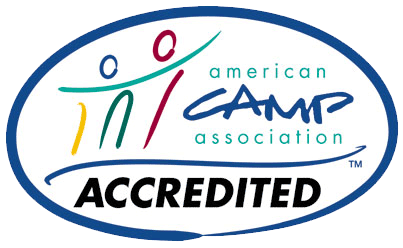Why an ACA Accredited Camp?
Look for the most important logo a summer camp can show.
The American Camp Association is the only nationwide organization that accredits children’s camps.
The ACA Accreditation process is a voluntary commitment by camps to the highest standards of health, safety, and program quality.
One purpose of the ACA Accreditation program is to educate camp owners and directors in the administration of key aspects of camp operation, particularly those related to program quality and the health and safety of campers and staff. The standards establish guidelines for needed policies, procedures, and practices. The camp is then responsible for the ongoing implementation of the policies.
The second purpose of ACA Accreditation is to assist the public in selecting camps that meet industry-accepted and government-recognized standards. ACA’s Find a Camp database is a helpful tool that assists the public in finding a best-fit summer camp.
In addition to these two primary purposes, the ACA Accreditation program:
- Has 50 years of history in developing and administering the standards program. Experts from the American Academy of Pediatrics, American Red Cross, etc., continually work with ACA to improve and develop ACA’s camp standards program
- Accredits over 2,400 camps in the United States and Puerto Rico (nearly 400 of them here in New England)
ACA standards have been recognized by courts of law and government regulators as the standards for best practices in camp.
Accreditation vs. Licensing
Unlike inspections by state licensing bodies, ACA accreditation is voluntary. The ACA does not have the authority to close or otherwise penalize an entity for not meeting its accreditation criteria, except for the removal of accreditation status. Licensing focuses on the enforcement of minimum standards. Accreditation focuses on education and the evaluation of camp operations, using standards that go beyond the minimum requirements of licensing.
Focus Areas of Accreditation
- Site: fire protection, food service, sleeping quarters, and bathing and toilet facilities
- Transportation: procedures for drivers, vehicles, and traffic on site
- Health and Wellness: staff qualifications, facilities, record keeping, medication, contact information, and health forms
- Operational Management: safety regulations and emergency procedures and communication
- Human Resources: staff qualifications, training, supervision ratios, and procedures
- Program Activities: aquatics, adventures challenge, trips, horseback riding, and special programs
Types of Accredited Camps
We categorize our camps in one or in a combination of the following ways:
- Day Camps: ?Typically serve children ages 3-16. Session lengths typically vary from one to eight weeks. Before-camp and after-camp programs are offered for an additional fee at some day camps.
- Overnight Camps: (also known as Resident or Sleepaway Camps) Usually serve children ages 6-17. Campers sleep away from home for the length of the session, which can vary from one to eight weeks.
- General Camps: These camps offer a broad range of activities. Many provide campers with the opportunity to focus on one or a few areas while encouraging them to try a variety of others. It is sometimes possible to explore an activity or interest in depth within the context of the whole program.
- Trip & Travel Programs: These are found in both day and overnight settings and involve exploration through active pursuits (like biking, hiking, climbing, rafting and canoeing) and/or exploration of a special interest (i.e. the arts, academics, community service, or touring local points of interest.)
- Specialty Camps: Based in day or resident settings. Popular options for specialization may include horseback riding, the arts, sports, computers, academics or travel. Programming revolves around intensive exposure to the specialty area.
- Camps for Special Populations: Camps that serve specific clientele like children or adults with particular medical conditions, disabilities, or special needs. Some camps focus on campers who share very specific diagnoses, while others are geared to meet a broader array of needs at any one time.
- Religiously-Affiliated Camps: ?Offer religious education formally and informally. Review materials carefully for explanations of how religion influences a camp’s culture to find one with the balance that best matches your family’s own values and beliefs.
- Family Camp Sessions: Sessions include family members of all ages from grandparents to infants. Accommodations vary, as do program options and session length. The focus is on being together as a family—to learn, to relax, and to enjoy new experiences and adventures.
- Short term overnight programs run by the camp: Sessions are generally three nights or less, run and staffed primarily by the camp, and include weekend retreats, short environmental programs, skill-training weekends, parent-child programs, etc. The camp staff for these programs is sometimes supplemented by adults from participating groups.
- Rental or lease programs run by rental group: Other camps, groups, or programs rent or lease the camp’s facilities – and perhaps some services – to operate their own camping programs or retreats.